Land Use and Development
Fortune Magazine’s Best Place to Live for Families in Georgia, Dog Park, City Marshall [Podcast]
Published
1 year agoon
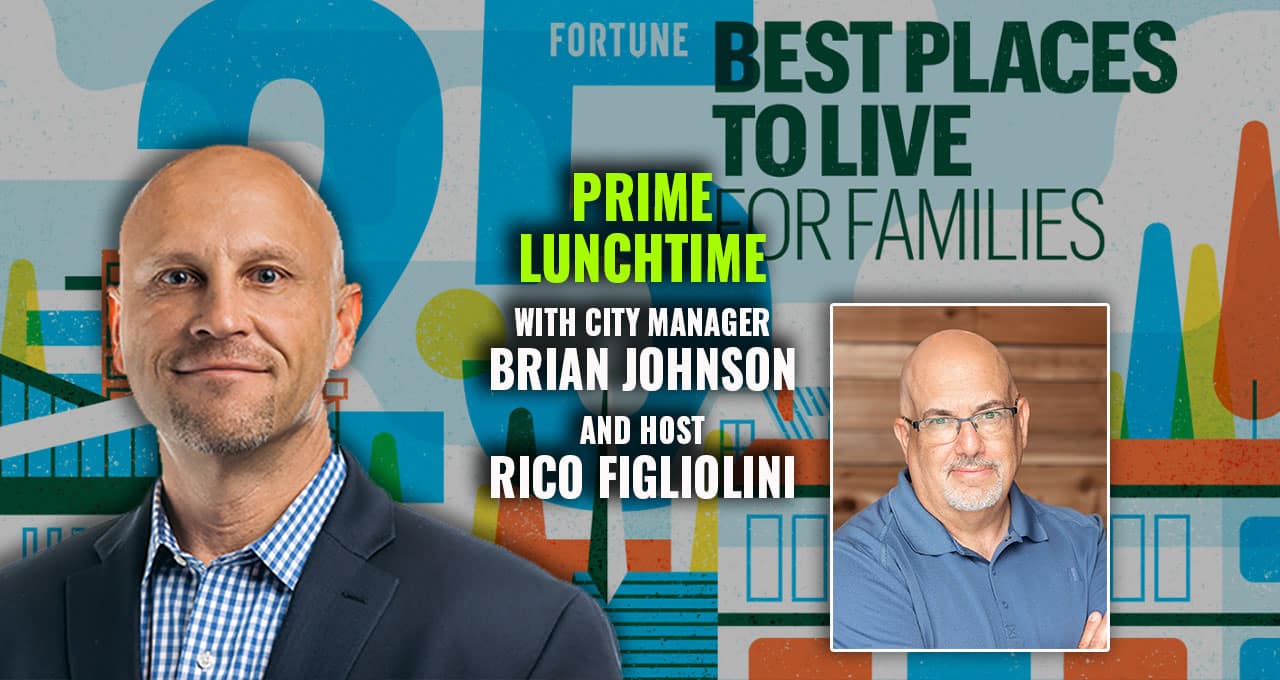
Host Rico Figliolini dives deep into the progress and future plans of Peachtree Corners, a city focused on providing its residents with an exceptional quality of life. Joined by City Manager Brian Johnson, they discuss the city’s recent recognition as the best place for families to live in Georgia, the establishment of a City Marshal system, the development of policies and procedures, and the expansion of the trail system. With a commitment to progress, collaboration with the private sector, and a dedication to fostering connectivity and recreational opportunities, Peachtree Corners is truly a city on the rise. Tune in to this podcast to learn more about the exciting developments and plans for this vibrant city.
Timestamp:
[00:00:30] – Intro
[00:03:46] – Fortune Magazine Ranking Peachtree Corners
[00:10:20] – City Development Plans and Projects
[00:14:22] – The City Marshal System
[00:24:16] – Park Development and Pickleball
[00:28:22] – Trail System and Dog Park
[00:39:41] – Closing
“Some governments have high millage rates and the government takes a lot of money from the citizens. Now it turns around and it puts it back into the community… So we could certainly do that, millage rates, but instead we would prefer to be facilitators. The more we can outsource and let the private sector run and not us, the longer we can go without a millage rate.”
Brian Johnson
Podcast Transcript:
Rico Figliolini 0:00:00
Hi, everyone. This is Rico Figliolini, host of Peachtree Corners Life and today, Prime Lunchtime with the City Manager. Hey, Brian, thanks for joining me.
Brian Johnson 0:00:09
How are you?
Rico Figliolini 0:00:10
Good. I hope you’re doing well going into the 4th of July weekend. Before we get started, though, let me just say thank you to my corporate sponsors that support us and the things that we do both in print and on digital. So Eli from EV Remodeling here based in Peachtree Corners and who lives in Peachtree Corners, supports us every day and the things that we do and the journalism that we put out on our magazines as well as now digital work. EV Remodeling, great place to if you’re looking to remodel either a small kitchen or a whole house remodel, they’re the ones to look at. You should go to Evremodelinginc.com, check out the site. They do great work. So don’t let that put you off, because the great work, some people look at it and say, I don’t know if I can afford that, but trust me, he does a great job and he’s at a reasonable place to be. So check him out. Our second lead sponsor is Clearwave Fiber. Clearwave does business, internet as well as home. They just came on about a month ago. And they’re good corporate sponsor of ours supporting the things that we do. And they’ve been a sponsor of, for example, the Criterion Road Race that just recently happened here in Peachtree Corners, and they’re a good supporter of the community. You should check them out. There’ll be a link in our profile. So go there and find out more about them and what they can do for you and your business or for your home. Check them out. So now Brian just learning so much that’s going on, there’s so much in the news. I just want to put it out there about one thing for sure in that everyone’s been like, because it’s been 24/7 coverage, that Ocean Gate expedition that’s been out there, that imploded, that’s been covered for everywhere from TikTok to CNN on a 24 hours basis. I did not know that one of the five guys on board that vessel was Paul-Henri, if I’m pronouncing this correct, Nargeolet. A longtime expert on Titanic and a member of the Em group that’s based out of Peachtree Corners. And that group actually puts these exhibitions I’ve been to, like the Titanic exhibition and the Bodies exhibition. They put those on. If anyone has seen those, they’re based right here in Peachtree Corners. Just amazing how much stuff is here that we don’t know.
Brian Johnson 0:02:26
It is kind of cool to sometimes uncover hidden gems in a city that you oftentimes, especially if you’ve been here for a while, be like, yeah, I know Peachtree Corners. I pretty much know all of the significant corporate tenants or entertainment opportunities or recreational locations, and every now and then something comes up and you’re like, wow.
Rico Figliolini 0:02:51
And sad too. In this particular case, for sure, someone’s been lost like that. But to know that a company like that actually is based out of our city of 45,000 people is really interesting.
Brian Johnson 0:03:04
The only company that has rights to Titanic artifacts for them to actually recover artifacts from the site. So, yeah, significant role they have.
Rico Figliolini 0:03:16
Yeah, and they just pulled up some of the wreckage actually just this past 24, 48 hours, I think.
Brian Johnson 0:03:22
Yeah.
Rico Figliolini 0:03:25
So I thought I’d bring that up. But the other thing is, I just saw this pop up on Google Alerts to me about, I guess it was about a week ago, and that was Fortune magazine. Through all they do, decided that Peacefree Corners is the best place for families to live in the state of Georgia. I think we’re in the top 50.
Brian Johnson 0:03:46
Of their picks, 19 in the country.
Rico Figliolini 0:03:48
19. I don’t even know if they reached out to the city at all to do any or if they did their own research. And that’s how they found us.
Brian Johnson 0:03:59
We were as surprised when it came out as anybody, so they did not communicate with us. If you read the article, they go into depth as to the data metrics and sources of data that they pulled from. And it’s important because sometimes you see a lot of these lists, and you could probably argue that in some cases there may be a little bit of subjectivity in some cases, but generally these lists, especially since this wasn’t a list where we were notified, we didn’t provide any information, there wasn’t a voting process. We literally had no idea. They tried to drive it based on data from everything from the Census Bureau to Johns Hopkins database on Thing. I mean, there was a long list of data sources, governmental or otherwise. But at the end of the day, there were a few communities that you might see in some of these lists that were eliminated. Because they did. Eliminate communities that had a median home income that was so high that it was considered not a good place for a family to go because it wasn’t cost prohibitive. And then there were a few communities and this is nationally, not just in Georgia, but a few communities removed that did not have a level of diversity that was outside of a band. So if you had some communities that were so homogeneous, one area, not just two, all white or all black or all Brian, any community that had too much homogeneous population numbers, they wanted ones that were, again, for families of all kinds.
Rico Figliolini 0:06:02
Right?
Brian Johnson 0:06:02
And then at that point, beyond those communities removed, their metric were around with families, you have lots of needs. You have housing needs. So are there diversity of housing options and pricing levels and size, which we obviously made, diversity of entertainment and recreational opportunities, but the quality and diversity of offerings for schools because families have kids. And you may want private school, you may want public, you may want whatever diversity of jobs, whether service based manufacturing, industry, commercial, blue collar, white collar, whatever. They want diversity of jobs and quality of jobs and then quality of health care because there’s obviously families from having younger kids to need it to also they talked about the fact that many families have parents of adult children that are needed to come back to live with them or you move them close to you because you’ve got a little.
Rico Figliolini 0:07:18
Bit of that going on. Sure.
Brian Johnson 0:07:21
So that was a metric that was considered, and even technology and the ability to have high speed internet access as you’ve got more work from home or virtual classroom or whatever. So all of those were taken into consideration, and they said that, look, when it comes to all of that, we’re a great place to live because we don’t control all of it. Sometimes we only have influence, some influence of varying degrees. We don’t control the school systems. We do have certain roads in the city that are state routes, and they’re managed by the state. We don’t control all the parks in the city and all the youth sports programs, but we certainly do things to help support them. And as a result, we’ve got a diversity of all of those things, from people to jobs to housing, health care. And they on the phone decided that we’re the best in Georgia and the 19th best in the country.
Rico Figliolini 0:08:35
I mean, Fortune magazine is a well read not publication even at this point, but well read news site. I mean, it’s been around for a long time, but for sure I think anyone that objectively looks at this city and all the things that’s being done and planned for and the way it’s being done we have no military on property, so people talk about, well, how can we afford to do certain things? Well, there’s sploss, there’s government grants. I mean, just alone, you mentioned earlier before we started the show, about a $1.2 million grant that’s being used. I think that was federal funds that’s coming in for environmental study and design for the Crooked Creek aspect of our trail system. So, I mean, the city is working in a very smart way. You, your team, the mayor, and the city council have really led the things that are being done here really well and intelligently coming into the right place. I was just to share with some of the listeners, obviously, the feasibility study that’s being done right now for the Pickable possible pickable, court center, private public partnership. You all are doing outreach. I was at one of those meetings one morning with the special group that’s charged with doing the feasibility study. I was impressed by the information they brought about, about the discussion. Even the mayor was there. Two city council people, a couple of residents, myself, a couple of other people, that are actually involved in pickleball the Putnams. So just that one meeting alone to find information out about just that aspect of what’s going on. Yeah, I mean, every city tries to do their stuff, right?
Rico Figliolini 0:10:20
Sugar Hill has a really big, beautiful theater that recently built. I mean, done the great job there. Every city has sort of an iconic thing that they do or path they want to go on. I know the city would love to do an art center art theater at some point. I know the mayor has spoken about.
Brian Johnson 0:10:37
That multi use of some sort. Right?
Rico Figliolini 0:10:41
Yeah. I’m not surprised that Fortune magazine would think that we are a great place for family to live. But it’s still surprising even still because there’s so many cities and towns out there.
Brian Johnson 0:10:52
There are reading the list. There were a lot of cities, I would say most of them I know of. I think Cambridge, Massachusetts, where Harvard is located, was the number one city. Denver, Colorado, was one of the choices in there. So it was everything from smallish cities to meet size all the way up to the big ones like Denver were on the list. And so, yeah, it makes you feel good, especially when we didn’t have anything to do with it and it happened organically. And it’s kind of like when somebody tells you you’re doing a good job. You didn’t ask to say, am I doing a good job or not? They say it they just out of the blue say, I see how you’re doing. You’re doing a good job. Keep up the good work. Kind of how this was. We’ve still got a lot of work to do. We are certainly not perfect. We have areas that we can improve.
Brian Johnson 0:11:49
We strive to do that every single day. Sure. But it is nice every now and then to be like some of the fruits of our labor have paid off at the point where people are recognizing.
Rico Figliolini 0:12:02
I know that you all are always under pressure. People are always thinking, what did you do for me lately? We’ve discussed this before about how people sometimes look at things and they think that they’re the center of the universe at that particular moment, and they want you to stand that and have you attend to their needs at that very particular moment. So, yeah, all those things are, I’m sure, drive some of this as far as feeling good about what you’re doing, knowing that you’ve done some good stuff.
Brian Johnson 0:12:40
And as a city government, our job is to provide services to our customers, which are our citizens here, in the form of making sure that they have a great safe place to conduct themselves, whether it’s live, work, learn and play, to make sure the roads are in good condition. Technology is there if they need it. Again, it’s safe. Commerce can happen in a seamless manner without a lot of bureaucracy. And when things are important, to somebody in the grand scheme of things I sometimes am like really? Do you really expect us to drop what we’re doing for that? But to some people, we try to really remove ourselves from that and say, look, if things are important to people only through the lens in which they look at it and there could be a dead deer on the side of the road and somebody’s all up in arms and somebody’s like, well, Public Works will get to a can. But to the person whose dead deer might be literally in their front yard, they’ve got to drive past it or their kids are going to walk to the bus stop from there. Whatever. It’s a big deal. We try to put that into perspective and make sure that we provide that and then beyond. Our role is to get out of the way and not be a government that’s all up into everybody’s business and taking a lot of money from them and deciding how to spend it. And it appears that that’s a good format for us to be a local government.
Rico Figliolini 0:14:22
So getting a bit into that even because nothing stops. Everything keeps moving along. I know we’ve spoken time and again on these podcasts about City Marshall system, for example, but it is a process and it just doesn’t start like that, even with the votes you guys recently took. Because you have to change a few things, add some ordinances, and set the legal operations of it up before your team can actually hire and set up. So I’m thin from our conversation before, ahead of the show that probably two city marshals will probably start somewhere around July 27 or so. But you do have to set up a bunch of things and we’ve discussed this before, where squad cars, where people live even. So you have to make sure that there’s affordable places for your hires to be able to live at also, I guess. Are you helping in that regard?
Brian Johnson 0:15:17
Yeah. If you think about it, what was on the city council agenda earlier this week is going to be the beginning of probably a continual stream of ordinances or policy adoptions that are going to be going on for the next six months. Because here we are standing a department that’s never existed. Here it is a department that is a very sensitive department in that policies that you have to regulate people who have by virtue of being post certified like all police officers have to be have the authority to do things like take away people’s civil liberties and that is a sacred thing. And so there’s lots of policies that have to be put in place as to how they’re going to conduct themselves, how they’re going to communicate intergovernmental agreements with Gwynette County PD down to what is going to be our use of force policy, high speed pursuit. Are we going to have them concentrate on area A or Area z or all these kind of things. You got equipment purchases, you’ve got all those kind of things. So it is a big it’s a major muscle movement, and we’re going to do it methodically. And they are being employed to fill a gap in between where code enforcement no longer has the authority and where Gwynette County PD, given that it is a county asset, there are certain things that they’re unable to do inside our city limits because we’re a home rule municipality. And so the marshals are going to fill this gap, but they’re not going to be out. They’re not going to be running radar on the roads to get tickets. They’re not going to be doing yeah.
Rico Figliolini 0:17:31
We talked about that.
Brian Johnson 0:17:31
How calls for service. Yeah. They’re not answering 911 calls. I mean, Gwinnett County Police out of west precinct is still our police department. Now that are going to be able to do some things and concentrate on some areas that Gwynette County PD either ant or doesn’t have the resources, given their personnel, staffing challenges they don’t have. And we’re going to be able to fill that gap yeah.
Rico Figliolini 0:17:59
For people to understand. We do have an intergovernmental agreement with Gwinnett County for a certain amount of, I guess, coverage and of police officers in the area during a period of time. I don’t know the details if that’s actually handled that way, but whatever service level we have is not going to change. We’re just augmenting with City marshall to do other things that, like you said, Winnett county can’t do because of resources they choose not to do because of lack of resources like enforcement, code enforcement.
Brian Johnson 0:18:32
Correct. And a good example of where this might come in handy, that it’s important to us and not to say it’s not important with FPD, but it would be something that they may just have said, hey, we just don’t have the manpower to do. It would be the challenge we’re having. When Norcross High School is in session with students, cutting class and walking through the woods into the rear parking lots of some of our businesses that border the back of Norcross High. We’re working on a number of things to resolve it, but having a patrol during certain hours, just the President’s patrol to kind of let the kids know, hey, there’s somebody here Gwynette just doesn’t have the manpower to do because they’re just responding to calls for service through 911 and other things. But it’s important to us. And so this is going to give the city the opportunity that when it’s more of a call, it ground level versus 30,000 foot level of importance. We’re going to be able to say, hey, I want one of you to be patrolling between, say, 930 and noon for a few mornings, because that tends to be when the kids are cutting class and they can do it because that’s an asset we control. If they do catch some kids doing something, they are going to have the authority to detain them, to turn them over to their parents or the school, or if it’s worse than just trespassing, even over to and they’re over 18 years old. It could be turning them over to Gwynette PD because they were caught in the commission of a Felonious crime. But an asset we will now have. That Gwynette just is like, look, we’re not saying it’s not important, but we have calls for service that are more important. And so those are the kind of things that we can do.
Rico Figliolini 0:20:27
Cool that’s out of existing operating funds and stuff like that. So that adding. There’s no talk of a millage rate to cover that. Move on. Let’s move on quickly to the feasibility study that’s going to be almost finished, I guess in the few weeks on that pickleball feasibility study. And then how long before they actually give a report back to the city?
Brian Johnson 0:20:51
Oh, probably actually only in a few more weeks. And they’re really going to provide, call it a scope of a pickleball facility that would fit three different categories. Essentially. One would be what size facility would it take for us to create a pickleball facility that was essentially only oriented to meeting the needs of ongoing league play? USTA or what is it, pickleball association of America, whatever kind of league play, just the ongoing stuff. That’s the kind of the lower level. Then the middle level would be what size facility would we need to be facilitating the construction of for us to be in the running for regional weekend tournaments that would be like ones big enough for the Southeast, not necessarily the national ones because that one so that’s the middle one. And then the top tier, which would probably only happen if we partner with say, a lifetime or a fields club or both and have them transition tennis courts into pickleball and we would make a submittal to the national association for a national tournament. But that would be what size do we need to do to compete at that level. And that’s the level where you’re competing against facilities in places like Florida and Arizona, even Southern California that are really getting into some big scale, 50 courts. That’s going to probably take partnership, but at least we’ll know. So we’re going to know the three levels of facility size. It would be for us to get a pickleball facility with a private partner and maybe use it as an economic development tool, whether it’s to enhance an area. Of the city that’s got a lot of activity or it’s a redevelopment opportunity to go and put it in an area of the city that could see a little bit of a shot of adrenaline in the arm. So this will give us what that is and then we’ll take that scope and we’ll start looking at specific areas, start maybe talking to potential private partners who may want to be involved in the construction and operation of this.
Brian Johnson 0:23:32
Our intent is not to be the sole funding source to construct it, nor do I want to be involved in operating a facility.
Rico Figliolini 0:23:43
Right.
Brian Johnson 0:23:43
Plenty of time happens. Cities and counties run them all the prime, but it just gets into creep of size, of government. I would prefer to like, we’ve done other services.
Rico Figliolini 0:23:58
It’s not like we have a parks department or wanting to create one. Like, Duluth has a parks department. That’s a whole different animal being budgeting that and taking care of your own park system. And we don’t need to do that. Right. Because Gwynette county has some beautiful parks right here in peace tree corners, and they take care of it.
Brian Johnson 0:24:16
Correct. The decision was made. Rightly. So back in the day that we happen to have Gwynette county happened to have constructed and operated a lot of parks in our area before we became a city. And even though after we became a city and you drew a circle around our city limits, those parks were now inside our city limits.
Rico Figliolini 0:24:38
Right.
Brian Johnson 0:24:39
County was doing just fine operating it. People still get to use it. It’s not like you all of a sudden couldn’t do it. So Pinkneyville park and Jones mill or excuse me, jones bridge park and Simpson wood and places like that, holcomb bridge park. And why would we need to do stand up our own additional ones when we already have absolutely. The stance that we’re taking here, too.
Rico Figliolini 0:25:05
Which is good, I think, based on what the consultants were saying originally, I think they were saying, like, something like this, once it’s decided, could take anywhere from 18 months to three years to develop. But they also agreed that based, I think, on a couple of city council people there also agreed that that’s way too long and that probably it could be done in a lot less time. We’re talking about maybe within a year. Even so, it’s good because you don’t want to be planning something three years out and then all of a sudden something else shows up during those three years. But good to see some city council people are willing to move faster.
Brian Johnson 0:25:44
They recognize there’s a little bit of an arms race going on with a ball and which one can get to the finish line first with something that’s drawing activity. And that would probably not necessarily definitively, but probably result in others backing off. Like if Dunwoody built a big facility just outside of our city, I doubt we’re going to want to do that because we’re like we’re fighting for the same crowd. It’s not going to be as utilized. There’s a little bit of a race to see if we can get to a certain level first. Yeah, I believe that we could potentially move a lot quicker if we find some good private partners in a good location. Do it.
Rico Figliolini 0:26:29
Yeah. I know you guys went on a tour sort of the city to different locations to see what could be used. Even at that same meeting, the mayor, because we can multitask, we can’t chew gum and walk at the same time. He also said that just because we’re doing this doesn’t mean that an art center or multi use center like that can also be in the plans. Of course, stuff like that take longer. I mean, just thinking about what Sugar Hill did with their theater, which I think holds about 400 people, they have balconies, they have a 20 x 40 foot stage with workshops there to build their sets. I mean, people don’t even think about those things. They think, why can’t we just put up a theater? There’s a lot that goes into that.
Brian Johnson 0:27:14
Well, we could, but to do so results in things like that kind of stuff takes money. And some governments have high millage rates and the government takes a lot of money from the citizens. Now it turns around and it puts it back into the community. But what that does do is that then means that that government is making some decisions with some money that could have been left into all of its citizens. So we could certainly do that, millage rates, but instead we would prefer to be facilitator. Maybe there’s some resources from the city that go into it, hopefully just one time to get things inject some lubricant in the process. But the more we can outsource and let the private sector run and not us, the longer we can go without a millage rate.
Rico Figliolini 0:28:13
Yes.
Brian Johnson 0:28:14
Or even one day if we ever had one, it remains low and it’s not really high. And so that’s our goal. Yeah.
Rico Figliolini 0:28:22
Makes sense. I think that’s what the citizens want. Absolutely. That’s the other thing we can talk about is that the trail system, which when fully developed, we talked about this being it’s going to end up being like 24 miles running through the city when it’s fully done in this project. Some of the revitalization redevelopment work being done on the south side, if you will, on Holcomb Bridge Road and stuff. I know that there’s been some property acquisitions happening to be able to end up putting trailheads to expand the trail system through Crooked Creek and parts of Petrie Corner Circle down out of Peach Tree corner Circles, maybe. Is that what we want to call it?
Brian Johnson 0:29:09
Yeah. So the section of Petrie Corner Circle in between Holcomb Bridge and Petrie Industrial Boulevard, which, by the way, I don’t know if you saw in the city council meeting last night. Council authorized me, at a request of the state, the section of what we call PIB from our city limits with Doraville all the way up to the split that is going to be renamed just Peachtree Boulevard. Just like Doraville and Shambley did south of us.
Rico Figliolini 0:29:44
Okay.
Brian Johnson 0:29:45
Years ago, Doraville said, look, PIB is not the industrial doesn’t have the industrial component to it like it did. We don’t like having that. And so they went through the process of just dropping the industrial. So all of that section of 141 that’s in Shambley, all of it is in Dorville, all the way up to our city limits is just Peachtree Boulevard. Well, the state is finally going to is in the process of making the signs that you see that are above 141, as you’re getting right before the split, that if you see it, you can barely read the letters now at night, heading north into the city. For five years, six years now, our public Works department director has been pushing to say it needs a change. And George Dot was like, we’re going to put it in a list of other cities and we’re going to do it all at once. And there were other reasons. But anyway, they’re finally ready to make them and they reached out. One of the state transportation board members reached out to us and said, hey, they’re making it. Do you guys want to go ahead and have that section change to just Peachy Boulevard? And so Council was like, sure. So mind you, that’ll be to the point where you have the split. And of course when you get the split, if you stay to the left, which is what 141 does, the state route stays to the left. That then becomes Peacetree Parkway.
Brian Johnson 0:31:16
And so State Route 141 will no longer have any industrial name to it. If you stay to the right, that then gets into County Maintained Road inside either US either Norcross or Berkeley Lake. And it goes back and forth as you head north. That’s a different process. There are more businesses on that section. Other governmental entities are involved. I don’t know if that will ever happen, but that would be more discussion. But at least in this case, while you’re on State Route 141, at some point before too long, there will not be an industrial as part of that name.
Rico Figliolini 0:31:58
So they’ll actually replace the signs at some point. So then you can read it.
Brian Johnson 0:32:02
That’s correct. So that sign, when it’s replaced, so you can read it Petri Industrial Boulevard anymore, it’ll just be Petri Boulevard.
Rico Figliolini 0:32:10
That’s terrific because every time I pass that sign, I’m like, we’ve redone our signs and everything. It looks so bad.
Brian Johnson 0:32:17
It does.
Rico Figliolini 0:32:18
Where are you heading into that? They have not changed that sign.
Brian Johnson 0:32:22
I mean, five, six years, we’ve had that periodically. But anyway, on the trailhead there’s a section of Peace Corner Circle that our trail system is going to go across. And so in addition to acquiring property that we’ll be able to construct it, we want people to be able to get on the trail at locations that you can just drive to it. It has a parking lot. You get out and then you walk on it. We’re going to create some trailhead areas like that. That will probably have bathrooms, parking area, playgrounds, and it can additional amenity for those apartment residents that live in the area.
Rico Figliolini 0:33:04
So I was wondering about that. So we’ll have playground set up over there as well.
Brian Johnson 0:33:09
Yeah, maybe covered picnic table, pavilions tables, things, a real recreational amenity.
Rico Figliolini 0:33:16
Okay, so not just a trailhead really. There’s more than so how much is being acquired then? Like I would imagine there has to be at least an acre or two, a couple of acres on either side.
Brian Johnson 0:33:29
Oh yeah, and more than that. Now both of the sections are in wetlands areas, so they are at higher risk for flooding at certain times. But all we’re putting in is bathrooms and playground stuff or whatever, which is not the end of the world. Nobody’s residing there and so we’re going to put it to use. They’re really undevelopable. But our acquisition, we didn’t go in and squeeze the property that we needed. We just went to the owner of the entire parcel that’s kind of in the wetlands and said, look, we’ll just buy the whole parcel. We’re going to leave a lot of the trees up, buffering adjacent property owners. So it’s more than just a couple of acres, but we only need a couple of acres to do what we’re doing. So yeah, one day it’ll be a good way for people in the area to get on the trail and it’ll be a good place for people to take their kids for playground or have a picnic or whatever.
Rico Figliolini 0:34:33
Most of these trails, I mean, they’re all multi use. I’m thinking like not the Rocket not the Rocket trail up in Swani area, but you could literally ride your bike then I’d imagine 24 miles route once it’s all completed and just right through the city, you could do like 48 miles bike ride through the city going twice.
Brian Johnson 0:34:53
It’s like the Silver Comet trail.
Rico Figliolini 0:34:56
That’s what it was.
Brian Johnson 0:34:59
A couple of our sections will connect to other communities that are doing the same thing. We are planning on connecting to a trail section where we border Sandy Springs right there on Balding.
Rico Figliolini 0:35:10
Right.
Brian Johnson 0:35:11
And so you’ll be able to take our trail to a section that you could jump on a neighboring municipality’s multi use trail system as well. Yeah, I mean, hopefully one day that you don’t have to just stay in peace street corners. But yes, theoretically you could just do a 24 miles lap on your bike.
Rico Figliolini 0:35:30
Yeah, I could see some cycling groups doing that. The other thing that’s coming about is that you guys I think, did the first read or you did the approval on the dog park coming to town center. Big, big dog, small dog. I think you said around September maybe we talked about it.
Brian Johnson 0:35:48
Council wasn’t a first. It didn’t require two reads. It was just council authorizing the money that the dog park is going to cost to be appropriated and for me to execute the contract. Okay, so it’s been executed. The contractor that’s going to build it has been given a notice to proceed. I think they’re going to start in about two weeks. It will not affect the town green because it’s on the backside of Cinnabistro there. So it will start in about two weeks. It’ll be done in about September time frame. And yes, it’s a pretty big facility. It has big dog section, a small dog section. And we are going to construct a small building that can be used to serve something, whether it’s drinks or food or both, into people within the dog park. So in other words and there’s a couple of locations locally. Buckhead has one where it’s a dog park. And then once you’re in the dog park, you can go up to a bar and get drinks and not have to leave the facility.
Brian Johnson 0:37:01
You actually go to a window that is oriented to inside the dog park. And so we may end up bidding it out and letting a company come in and operate it at certain times to where if you’re there and you want to just chill for a little bit and you want to go and get a process, you can and not have to leave your dog in dog park.
Rico Figliolini 0:37:22
It’s almost like a concession stand.
Brian Johnson 0:37:24
Yeah, I mean, a little bit.
Rico Figliolini 0:37:26
You’ll have a patio with some seating.
Brian Johnson 0:37:28
Areas that are oh, yeah, definitely covered. Lots of seating. Some of it artificially shaded. We’re not removing we’re not clear cutting the area. Each section has both a special turf area and a section that’s being left open to just mulched area.
Rico Figliolini 0:37:49
Okay.
Brian Johnson 0:37:51
It’ll be used a lot, but it does increase maintenance because we’re going to have to have our crews hose it off periodically. Probably after people who don’t do the right thing by picking up after their dogs in the dog park.
Rico Figliolini 0:38:07
Yes. God knows there are people like that. They never no responsibility. God knows. The restrooms as well, or no, not.
Brian Johnson 0:38:16
In additional to the ones that are already out there. No.
Rico Figliolini 0:38:21
All right. And that’s coming in September. So that’s starting like July 14 or so somewhere around there. All right, cool. So we’ve covered quite a bit. Looking forward to more things happening. I know there’s more things out there happening. So city never sleeps.
Brian Johnson 0:38:36
Almost chance we’ll get left behind if we do.
Rico Figliolini 0:38:39
Yes. Apparently there are always things happening. Even with curiosity. Lab. There’s always an article we’re writing about. I mean, we just had one recently about Audi partnering with the city. And Curiosity Lab that’s in our newest issue of Southwest Gwynette magazine that’s coming out this week, actually hit the post office today. So it’s being dropped later this week, today being June 29. For those that might be listening to this a bit later. Yeah, there’s stuff like that. We’re doing another story, I think, covering Dell startup taking place actually here in history corners, so we’ll be covering that story. So there’s always something that’s going on, whether it’s Atlanta Tech Park or Curiosity Lab, that whole big thing. So it’s never a dull moment here. And it’s no wonder Fortune magazine thought we’d be the best place for your family to come and live. So this good stuff.
Brian Johnson 0:39:39
It is.
Rico Figliolini 0:39:41
Brian, thank you for being with me today and sharing all the good information that you have. Always appreciate.
Brian Johnson 0:39:47
Thanks for having me.
Rico Figliolini 0:39:48
No, I love doing this. Great. And if anyone has comments or think that we should be discussing other things or have suggested topics either for these podcasts or for the magazine or anything, leave your comments. If this is on Facebook or YouTube, leave it there or email me. You could do that at editor@livinginpeachtreecorners.com and that’ll get to me.
Brian Johnson 0:40:16
If you ever get any of those, I’d be happy to have previously submitted topics that somebody was like, you know, I’d really like you guys to talk about X. I got no problem with that whatsoever. You and I, we’re just in the interest of time, are skipping lots of other things we could talk about. So I’m always open to things that a listener wants to hear us talk about.
Rico Figliolini 0:40:41
Good, because I’m actually developing, besides developing a third magazine that will be surrounding that’s going to be called Atlanta Pickleball Magazine, that’s covering the North Side, going north of Buckhead into the suburbs. But I’m thinking about doing some sort of live stream that’s a real live stream, either on Twitter or on TikTok or something else where we can talk and people can actually comment and ask questions as we’re having a conversation.
Brian Johnson 0:41:15
No problem. If somebody live submits a question, I’ve done that many times. You’re able to get that. No problem whatsoever. I mean, I’ve done my last city, there were callers that called in.
Rico Figliolini 0:41:30
Yes, I’m sure.
Brian Johnson 0:41:31
It’s not even like you have to send it via a written form. They just call in and we’re talking to them directly.
Rico Figliolini 0:41:38
I think that would be kind of cool to do that. I’m looking at whether it’s on Twitter or TikTok or one of the other platforms, that we could do this on a live feed where we can have a back and forth and have live comments coming in that we can answer or ignore because you never know what comes on those comments. But yeah, if you’re all for that, absolutely. Thank you, everyone. I appreciate you joining us. Remember, leave your comments and like us. If you’re listening to this on an Audible or one of these podcasts, whether it’s on Spotify or Apple, leave your review because that’s how people find this as well. Thank you, everyone.
Related
Land Use and Development
Transforming Offices to Apartments & Building, and New Cities from Scratch with Brian Johnson [Podcast]
Published
2 months agoon
June 5, 2024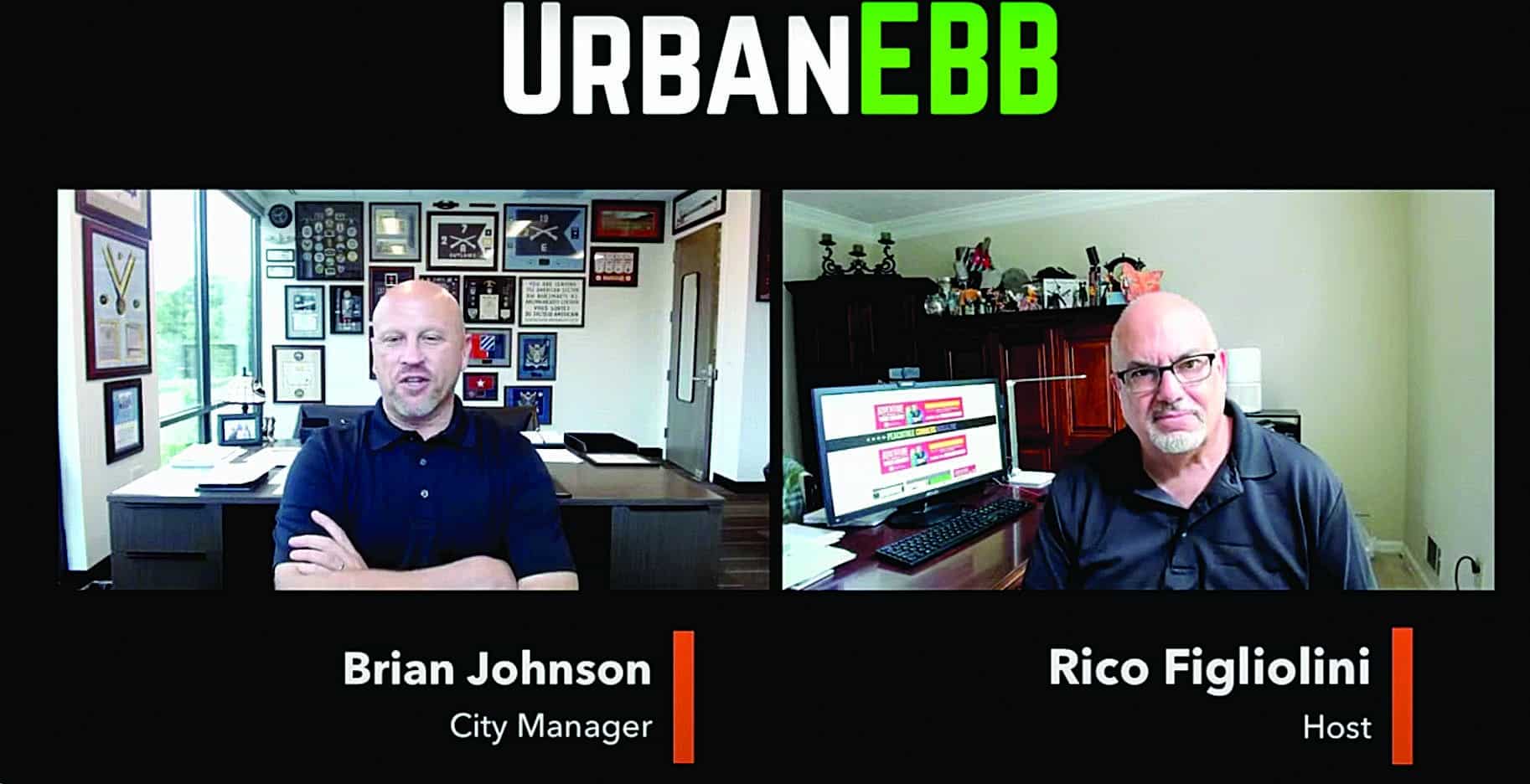
Converting office buildings into apartments is a complex and challenging process, often met with a low success rate due to the inherent design of office structures. Warehouses, on the other hand, offer a simpler conversion path. In this episode, Brian Johnson delves into the intricacies of these transformations and explores what it takes to establish a new city within a metropolitan area, especially when residents feel their taxes are being misused or siphoned off by the county. The discussion provides insights into the complexities and considerations involved in the process of cityhood. Hosted by Rico Figliolini
“Cities have to find ways to generate revenue without always going back to the well of property taxes. If we want to be a community that attracts people, we have to be innovative in how we fund our services.”
Brian Johnson
Timestamp:
00:00:00 – Peachtree Corners’ Office-to-Apartment Conversion Myth
00:03:00 – Adaptive Reuse of Mixed-Use Development
00:05:31 – Repurposing Warehouses and Offices into Lofts and Townhomes
00:08:19 – Impressive Growth and Safety in Suburban Location
00:09:44 – The Evolution of a New City: Challenges and Opportunities
00:13:25 – Transitioning from Unincorporated County to Incorporated City
00:15:57 – Exploring Municipal Funding Strategies
00:17:33 – The Rise of Local Control Through City Creation
00:22:30 – Considerations for Becoming an Independent City
00:24:56 – Considerations for Cityhood Movements
00:27:10 – Navigating City Finances and Service Delivery
00:30:44 – Balancing Municipal Responsibilities and Resources
Podcast Transcript
Rico Figliolini 0:00:26
Hi, everyone. This is Rico Figliolini with Brian Johnson, city manager at Peachtree Corners in the state of Georgia. Hey, Brian, thanks for being with us. This normally would be Prime Lunchtime with the City Manager, but I’ve decided this episode will be part of UrbanEbb, a brand new podcast I’ve been doing with several different people from several different cities, talking also about culture, politics, planning, development. And we’re going to be talking in this episode about city planning becoming a city. How does an area decide they want to be a city? But before we get to that, we’re going to talk about Peachtree Corners was like top three or number one leading a specific area nationwide. And that was about office conversion to apartments. And Brian brought me some real facts about this. So, Brian, why don’t you tell us how this erroneous article stated it and what the real facts are?
Brian Johnson 0:01:27
Well, you know, especially when you’re in a position like me as a city manager of a city, you know, anytime the city that you’re managing is in the news, you always hold your breath, especially when you know why. You know, if my communication director was doing something and I had directed it, and, you know, everybody knew why. But I get the Atlanta business Chronicle email, which has all the titles of some of the stories in there. I see Peachtree Corners in the title, and the title is Peachtree Corners leads us in office to apartment conversions. I’m like, what? So I read it and it said that we had converted a conversion of 295 apartment units going into an office. An office being converted to 295 apartment units led the nation in that conversion. And like you and I talked earlier, the first thing is, you know, 295 leads the United States of America. I found that to be a little bit low. But what was even more telling is the fact that we have never had an office to apartment. I like, we don’t really lead the country in office to apartment conversion, since we’ve never had one. So, you know, the Atlanta business Chronicle is going to run a corrected story. The data that they wrote, the article was not from them, and they did not say it was. It’s from a company called Rent Cafe. And there’s a number of companies that they do open records requests on all rezonings. They take data and they put it in databases. And then they sell the data and cafe erroneously took, we believe. I don’t know for sure, but we know that they based this off of the mixed use development that’s on Peachtree Parkway called Broadstone. And it is about a ten acre mixed use development that has about 25 for sale townhomes, 295 apartment units, and then a. An existing office building that was essentially cut in half vertically. Half of it, all the floors and roof were removed. They let, they kept the exoskeleton of that half of the building. And that provides kind of a, an environment for the community pool and pool deck and everything. And then the other half was renovated. But it’s their, their workout room for the mixed use there and co working space.
Rico Figliolini 0:04:25
Correct. Second story is the co working space there.
Brian Johnson 0:04:28
Right. And so we believe that this rent cafe took some narrative, probably from our staff report, in which we were talking about adaptive reuse of an existing office building, which this. It was.
Rico Figliolini 0:04:45
Yeah.
Brian Johnson 0:04:45
But they assumed that the adaptive reuse was to apartments. And then they pulled the 295, which is the number of apartment units that are on the site, and made the assumption that that conversion happened. So it didn’t. We’ve never had it. Conversion. Conversions are hard. We have discussed trying to convert some to equity. And what generally we get back is if you build an office building, it’s designed to provide building amenities that tend to be more wide ranging and more centralized, like h-vac units are not individually set up. It’s kind of for like, the whole space as a whole. One of the biggest costs are bathrooms. You don’t have plumbing at varying increments. They put all the plumbing in one big community bathroom area. So for then you to go back out and have to cut it up and add all the plumbing, it just becomes cost prohibitive. And so developers tell us.
Rico Figliolini 0:05:57
Right, it’s easier to convert a warehouse because of the open space and stuff into living lofts and stuff like that, or demo it.
Brian Johnson 0:06:07
So the one we have on Engineering drive that the wig owned that they just proved 75 townhomes, an existing office, but it was demoed to build townhomes because it was cheaper than to go into the building and try to cut it up into. So a new.
Rico Figliolini 0:06:29
And even the repurposing of that office behind Broadstone, they thought they’d be able to repurpose that whole building. Right. But once they started demoing, I think the fact is that they found half the building couldn’t be used or something.
Brian Johnson 0:06:42
So they, structural elements of it had been originally constructed using poured concrete and not steel, and they didn’t wrap it and moisture got in. And so part of the building ended up having, you know, it was structurally unsound. And so, yeah, I mean, they did a great job with what they did to make exoskeleton around their pool and put in pool.
Rico Figliolini 0:07:13
Yeah, love that idea. They actually kept that, the metal girders overlapping there like that. So it’s kind of cool to be able to do that. You don’t see that type of stuff here normally. You might see that in, like, buckhead or Brookhaven. They have older buildings there. Out here, it’s much newer, so you don’t get to see that type of use. Right. That normally would be a structural thing that would design as that look, you know, and I found that also Broadstone apartments, 290 odd apartments. They are actually three months ahead of schedule in renting. I think they’re almost at like 82% capacity right now in rentals there.
Brian Johnson 0:07:52
I’ll go one step farther. Alliance and that developer, and they’re an international housing developer. They are. They’re represented by legal counsel, who is representing upcoming mixed use development for. At the city around the building.
Rico Figliolini 0:08:16
Okay.
Brian Johnson 0:08:18
At the planning commission meeting, you know, apartments and all this stuff came up, and the legal counsel said that alliance just announced that Broadstone, this is an international company now, leased up faster than any other property they have ever had in their, in their history, really.
Rico Figliolini 0:08:38
I mean, when I heard that it was three months ahead of goal, I was like. And that maybe. And they just opened some months ago has been a long time. The rents are pretty, you know, I mean, high also. So I’m just.
Brian Johnson 0:08:55
Yeah, they can be.
Rico Figliolini 0:08:56
I think one of the people I spoke to there had told me that it’s just. It’s a great place to be placed because it’s 20 minutes into the city, practically, depending on when you go. It’s 2030 minutes in to midtown, maybe. And you have to deal with the crime down there, living down there. Just come up here and they feel safer, way safer up here than they do if had they lived down, let’s say, Brookhaven or Buckhead area stuff. Plus the rent’s not as expensive as down there. The amenities, pretty good. So. Yeah, so it’s. I’m sure they’re doing a great job. So if they’re going to be doing that day building. How’d that go? That was a first read on that.
Brian Johnson 0:09:36
Well, it’s planning commission. First read. First read was this last Tuesday. So next month be considered by council.
Rico Figliolini 0:09:46
So this is going to be a short episode of UrbanEbb. Actually our normal episode, if you will, 30 minutes. But we wanted to get into cityhood a little bit. Right. City of Peachtree Corners has been around. How long have we been around now? Twelve years. Yeah, about that. And we started out as when it first got voted, and the first rendition of it, if you will, was that we were only going to have three services and we were going to be a light city. Right. Years pass, a couple of things happened. Obviously, there’s no such thing as a light city. Apparently it’s unconstitutional. Every city is the same in the state of Georgia, so we all are able to be full cities if we want to or just retain certain things like police services being coming from Gwinnett county. And thank God Gwinnett county has agreed to provide that type of relationship with us so we don’t have to do our own police service. The reason we’re talking about city stuff is that the city of Mulberry on May 21 was actually voted now into cityhood. So they will be the second largest city in Gwinnett county.
Brian Johnson 0:10:59
The largest by landmass. They’ll have like 2 sq. Mi. More landmass than we will, but different makeup.
Rico Figliolini 0:11:07
Right, because they’re before the show. Yeah, we were discussing that there. I don’t know if these numbers accurate, but 98, let’s call nine in the nineties percentile of only residential homes. So that’s.
Brian Johnson 0:11:22
And that’s a big. Because we derive 22% of our general fund budget comes from our business license. Revenue come from the interact. Well, come from basically our local economy. The company here having to get a business license based on gross receipts of what they generate within our city limits, that’s a good chance. A decent chunk of change on an operating budget like what you use to run on. And with a city that is in the high 90% residential only, they’re not going to really have occupational tax, you know, to speak of, because there’s not many businesses if they’re that high. So that’s a decent chunk of change that they won’t have access to at all.
Rico Figliolini 0:12:20
So that also means, we were talking before about franchise taxes with utilities, that some of that money will be coming back to them. They don’t want to do a property tax, apparently. Correct.
Brian Johnson 0:12:33
It’s in charter that they shall have a zero millage rate unless a referendum is held to that. A successful referendum is held to authorize the city council to levy a millage. But, yeah, that’s certainly the goal for.
Rico Figliolini 0:12:52
You to put it in a chart does the city. But the city can change that charter anytime they want by simple majority vote.
Brian Johnson 0:13:02
That’s correct. Most people, even though cities and counties are what are called subdivisions of the state. So we only exist because the state decided to let cities and counties exist. And when we are created and our city limits are drawn, we, you know, we kind of have, upon becoming a city, certain immediate rights or powers that nobody else, you know, can. Can mess with. We are like the determiner of our destiny at that point. So before we were sitting in Peachtree Corners, the county maintained all the roads that weren’t the two state routes here. County provided place. It was unincorporated county. As soon as we became a city, immediately, the county had no right to do anything without our permission. They had to stop collecting hotel motel tax because those are now our hotels motels. There’s no such a thing as a county road in the context of, oh, that is ours, you know, in perpetuity. The county voluntarily, thankfully, decided that certain roads were so expensive or not expensive, important as kind of a feeder system of the greater county, that they voluntarily said, we’ll continue to maintain those roads. We were like. But beyond that, everything on future decisions are the express and final decision of the duly elected city council. And the state doesn’t have the right, once city’s created, to change laws that only affect one city. When the state does a law, it has to affect all cities or none. And so the charter is another one where putting in a prohibition against a property tax, you can have that language in the original legislation creating the city, and it can be the first language in the charter once the city council is seated. Yes, the first order of business could be a motion in a second to remove that statement from the charter, and that city council could immediately amend the charter and remove it. Now, obviously, there will be political consequences, as you know, for sure. But, yeah, there is no prohibition. Having it in the charter is not a, you know, sacrosanct step where, oh, you have to, you know, Jesus has to miracle it because, I mean, it has to be.
Rico Figliolini 0:15:56
You’re right, there are political consequences. Right. So if the majority of seven council people decided to change that. Yes, they would. Right. But, you know, good intent. Right. There’s good intent to some of these things. Right. They don’t want a millage. Right. Right. That’s how they ran. And that’s how, you know, if a city could do that, that’s how. That would be the best way to do it. Right. This way, citizens don’t have to pay a tax and let the businesses, the for profits, pay those taxes. Right. But if they’re responsible and they realize a year or two or three into it that, well, they can’t make it this way, they need to adjust. Or I guess the other thing could be annexing. If there’s unincorporated areas next to you, and you say, well, heck, that’s a big mall over there, and it’s in the unincorporated. Maybe we can annex that piece of property, because that’s right next door to us. And now they have business taxes. Right. And occupational taxes. That’s one way of doing that. Right. And the other way could be, I mean, most of that area is single family residential, I believe. But let’s say it was apartments. And, you know, going back to that, first thing we talked about, could be conversions, could be, you know, becomes a multi use where maybe there’s more density placed. There could have been one of those garden apartments where there were only 150 units. Now it becomes 300 units and a multi multi use.
Brian Johnson 0:17:28
Well, there’s the problem with that. Rico, what you said is accurate. That is a way to do it. In the case of Mulberry, the impetus for this cityhood movement was essentially anti growth.
Rico Figliolini 0:17:43
Yes.
Brian Johnson 0:17:45
Apartments. And that was the rallying cry for local control. And, you know, which does improve when a city is created. It isn’t the end all, be all, because there are still legal rights property owners have. So city council here certainly has a better grasp of situations that they vote on from a land use standpoint than the Gwinnett County Commission would, especially now we don’t even have one commissioner that lives in Peachtree Corners. Lynette Howard did live here when she was on the county commission. So, you know, in some cases, these commissioners wouldn’t even know anything about what’s happening, you know, down here. But even though council may know the issues better, you know, they can’t just indiscriminately deny things just because they don’t like it without there being legal repercussions.
Rico Figliolini 0:18:41
Correct.
Brian Johnson 0:18:41
And so. But it does improve local control because the council collected officials tend to be a little bit more responsive when they’re seeing their constituents at the grocery store every day and, you know, at the gas station and at the gym. You know, when you’re a county commissioner representing 250,000 people, the odds of you running into somebody, you know, that really, you know, that might campaign against you or something like that, you know, if you don’t do whatever is much lower, I get why they’re. That’s going to be difficult if they run out of money for them to just be like, oh, we’re not going to raise any rates or taxes or whatever. It’s a tough, you know, we don’t have a prohibition against having property tax, but council’s commitment to the residents is that they will do everything in their power not to have city property tax. And so we operate, my staff and I operate the city accordingly.
Rico Figliolini 0:19:46
Yeah, I mean, the only reason apparently to. We had discussed this over the years, I think, about having property tax would be if we were, like you said, operating in the red, or we needed to do things where we needed a large amount of capital and we need to get through an authority or through a bond. However, we would set it up that most financing places would not issue bonds to, let’s say, do major improve capital improvements unless there’s a millage rate in place. Right. I think we had.
Brian Johnson 0:20:25
You know, the bond community is like, all right, I loan you a bunch of money and if things get tight at the city, we don’t want you to make the decision that, you know what, we’re just going to default on that bond payment so that we can meet budget, you know, operating expenses elsewhere. So like general obligation bonds, true, general obligation bonds, where the community votes on it, bond actually have mechanisms in there that if the city could not afford the bond payment, it would compelled to levy a millage to increase our revenue to the point where it could. That’s the whole full faith and credit of the city behind the bond. You can privately place bonds with just the bank without having that component. But the transition starts to get into dollars. You know, we’ve floated when that we didn’t float about, we privately placed a $10 million bond that within our ability to pay it out of pocket every year. You get some of these, like, I know, Marietta, what was it, Franklin street that they did the big. And they floated like a $200 million bond or maybe even higher it went just sweeping through and bought up all the dilapidated stuff and then just redeveloped the whole corridor. You’re going to have to get, you know, that’s where the voters. A lot of market polls because.
Rico Figliolini 0:22:03
So I guess that’s one of the things that we would talk about trends and stuff. Back. Back in the early twenties, there weren’t a lot of these movement towards cities in these becoming new cities. But as over the past decade or so, there’s been a lot of movement towards creating your own city, especially up here in northern, above north Atlanta, you had the city of Milton, you had John’s Creek, you had a bunch of these. I think Tucker may be the next one. Or, I mean, there’s a bunch of these that have one Brook cave. Brookhaven. That’s right. City of Brookhaven. Right. So, I mean, they’re all trying to get away from county control or from supposedly monies going to other parts of the county where they felt they’re not getting enough bang for their buck. So a lot of money is coming out of one place and maybe being drawn and used in other places. So there’s that trend for being a city. So in our limited time here, what would be the three things that you, Brian Johnson, city manager and having gone through this and have been a city manager in other cities across this country, southeast, what would you recommend people should look at before they go stepping into this? What are the three things or maybe more or less that they should think about?
Brian Johnson 0:23:25
Well, you know, first is there’s a lot of unknowns that you still world of unknowns that you step into when you become a city. You know, it’s almost a little bit like growing up. You know, kids at a certain point, they’ve got this level of independence and they’re kind of thing at the rules of mom and dad. And, you know, you start getting to this, well, I’m going to go out on my own so I can make all my own decisions and I don’t have to live. But when they do step out and all of a sudden, all of these responsibilities are theirs, mom and dad aren’t the safety net to remind them to pay that bill or to do whatever.
Rico Figliolini 0:24:12
Great analysis.
Brian Johnson 0:24:14
How many can get? Like, whoa, I didn’t realize that there was all this work, you know, this and that, and a little bit like that with cities. So I would first start and say, I think there needs to be good motivation to do that. You mentioned a few of them. Most of the Fulton, north Fulton county cities were motivated because property tax revenue the county was charging was basically being collected from the northern area. And then the redistribution of wealth argument that drove a lot of Sandy Springs and Johns Creek, you know, people to the polls. Some of the Dekalb county cities, you know, Tucker, you know, Brookhaven tended to be Dekalb county government is so inept and corrupt that we just don’t want to depend on them for stuff. So let’s just go ahead and do it. Then you probably say, you know, there’s a few exceptions. You know, the Gwinnett, you know, Peachtree Corners was a little bit of this. The Sharon Springs attempt up in Forsyth, certainly the Mulberry generally a little bit about land use decisions. They were kind of like, felt like the county commission of Gwinnett representing such a law. They have five commissioners for basically a million people, so each commissioner presenting 250,000. And there are examples where it’s hard for you to intimately get up to speed on everything that you’re being asked to vote on. And Peachtree Corners want a little bit more local control over certain things. Certainly Mulberry as well. And then the last example is yet two examples, eagles Landing and Buckhead, which were attempted cityhood movements in which an area of an existing city tried to secede the city. Buckhead is merely a. A named, you know, a generally accepted named area of. City of Atlanta. It is city of Atlanta. And, you know, for them to become a city would have actually required them to secede from the city of Atlanta. I mean, just a bizarre and I think, dangerous precedent. So, anyway, I would say make sure motivated for the right reasons, because there have been examples I have been asked to consult with that they didn’t necessarily do it for the right reasons. And as a result, you know, there was really not the interest. Once you do that, make sure you know which services you really want to have the control of. You know, if it’s. If, you know, if solid waste collection is a big, controversial thing and you want to have control over who’s going to pick up your trash, then make it something you’re going to do. But, you know, don’t just wait into areas just because you can, you know, like, oh, you can. We can have our own parks and rec department. Well, those departments are black holes for money. They all lose money, you know, so you just got to be careful of what you want to get into. And then the third is make sure that, you know, your eyes are wide open on, you know, in the guess in the area of service delivery, in that there are certainly things in the future. Some could be your own doing or some could be at, you know, the political winds of the community push you that way, and some could be you didn’t have a choice. But there is a risk that you find yourself having no more money and there’s some other expense that drops in your lap or is being pushed on you. And that’s all fine. Cities have lots of ways to generate revenue. But if one of the main tenants of your cityhood is like, you know, no city property taxes, whatever, it’s all great goal, but know that you may find yourself one day not having a choice. That’s the one bad thing with you. Know, almost like the kids leave the house and one day they can’t pay all their bills. They have one or two choices. They can do something to make more money, like get a second job, or they can cut expenses. They could stop, you know, having cable television or a Hulu subscription. Cities can do the same thing. We can decrease the level of service that we do. In some cases, we can stop doing certain things. So, I mean, just, it’s like a household budget, but. But as long as people know, it’s the balance of, you do have local, more control. And, you know, we struggle with this here a little bit with police. We’ve talked about it. We have a good arrangement, but we do not control police as directly as we would and could if it was our police department. We sometimes run into differences of importance. You know, for us, our town center is extremely important thing, and we’ve generated a lot. We’ve created a lot of activity out there, for sure. We would probably push more police presence in that area preemptively than Gwinnett does. Gwinnett tends to be like, look, that is not a priority for us, and we don’t have the resources to preemptively just have police there will respond if we need to, but we’re not going to. That’s just the difference of both resources and priorities. But that’s what with the new city, and that’s kind of the, that’s the debate.
Rico Figliolini 0:30:13
They tend to be a little bit more reactive, especially not having enough police to be able to cover everything they need to. We’ve come to the end of this. But what I realized, it’s funny, we were brainstorming a little bit before, is that I’d like to do a part two of this a little longer, maybe, and discussing what it means to do services and what the pros and cons are, and politically speaking, a little bit to a degree, because county can say to a city, you know what? We don’t have enough offices as it is. Why don’t you take care of your own police force? Because they can’t say that, right? They don’t have, there’s no rule that says they have to provide it. And they can say, okay, we’re going to redirect the rest of our police force to the unincorporated areas because we could now put more attention to that. You all are your own city, so handle it yourself. So there’s so much more we can talk about.
Brian Johnson 0:31:12
Well, even real quick, Rico, on that one. A big part of ours is we have a lot of mission creep with residents wanting us parks, why doesn’t the city just buy that and turn it into a park? Well, that takes money to buy and it takes money to maintain. And if we turn, if we bought and turned everything, every time we get that into a park, we, you know, run out, we wouldn’t have enough money. So it happens even out of the most innocent.
Rico Figliolini 0:31:40
Yes. You know, and I appreciate that. I do. We get that in business sometimes, especially when I have a retainer clients to think, oh, they can, they can get more out of this. It’s like, no, no, you really paid for this. That’s all you’re going to get, please. But. So we’ll probably do a part two on this, I think. I think to get people to understand more, and not just us, but I think spread that knowledge out to other people, other people planning to maybe possibly doing a city across the country and stuff. So. But I want to thank Brian for being with me today. Thank you. And this is just ahead of Memorial Day weekend, so appreciate you being here with me. And thank you, everyone. Sure. Hang in there for a sec. But thank you, everyone, for being with us.
Related
Community
Peachtree Corners’ Waterside Community Unveils Clubhouse and Amenities [+ PHOTOS]
Published
6 months agoon
February 11, 2024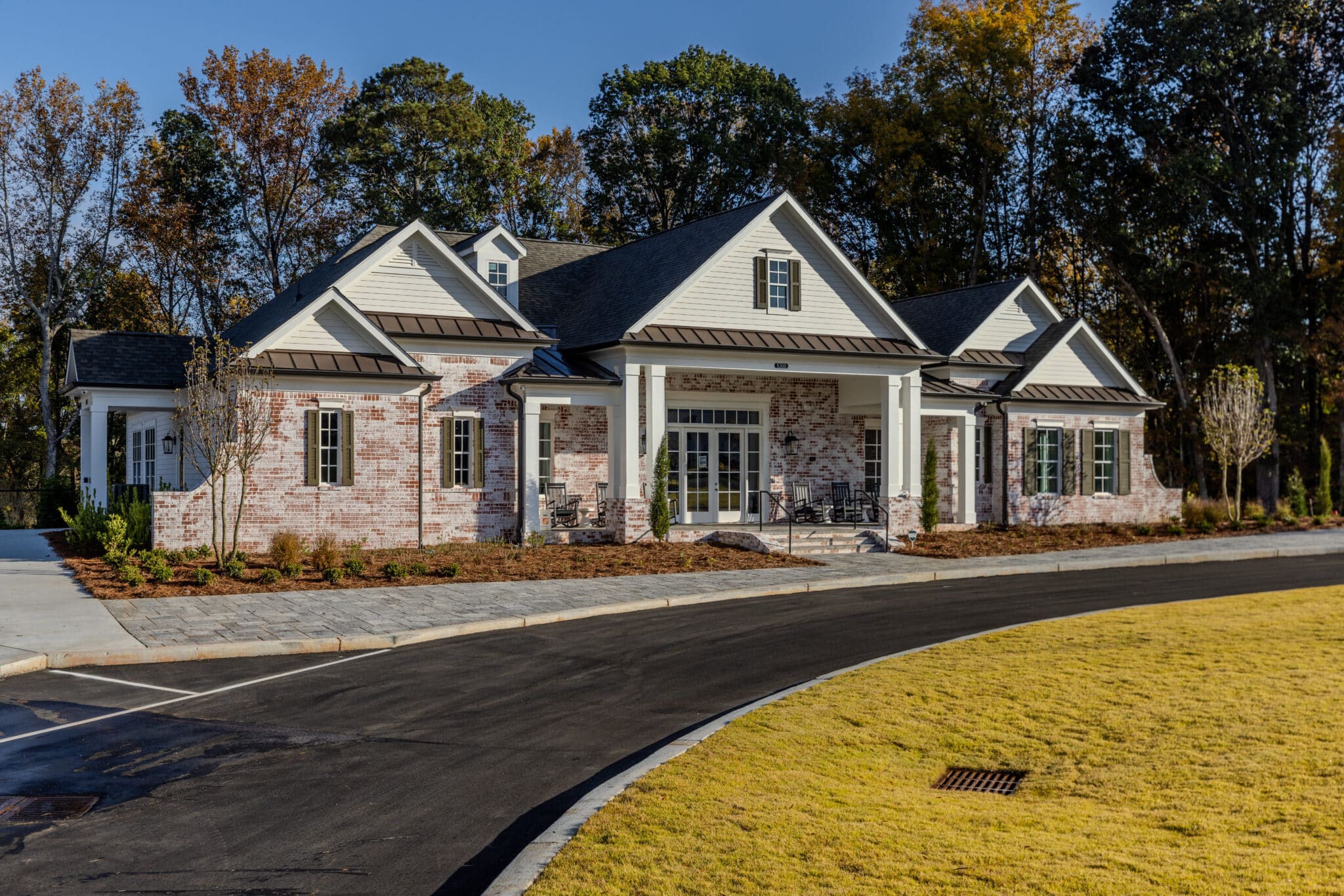
The Providence Group of Georgia, a Atlanta homebuilder and developer, and its joint venture partner East Jones Bridge River Holdings, LLC, has put a whole new spin on amenities in the community of Waterside.
Located in Peachtree Corners and situated along the shores of the Chattahoochee River, Waterside provides multiple housing options that promote inter-generational living for those looking for a age-in-place community.
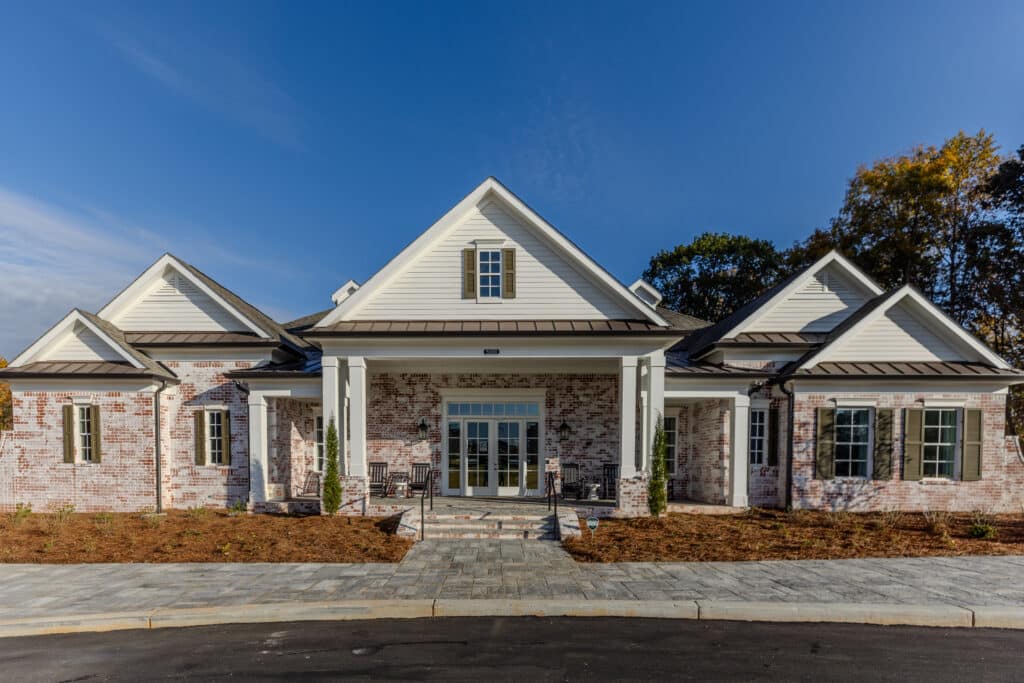
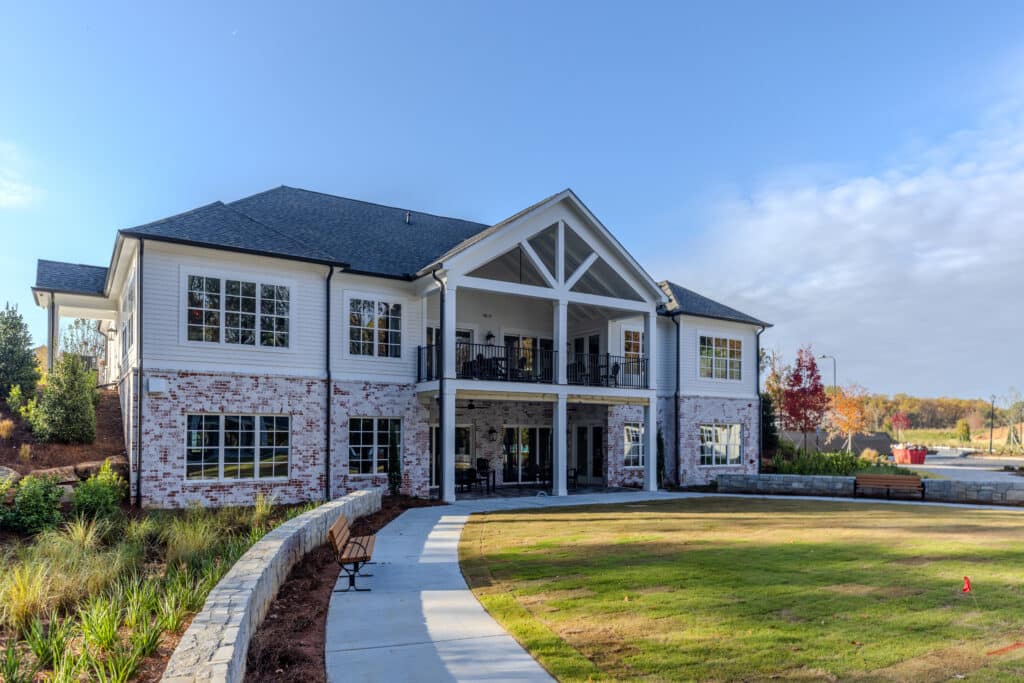
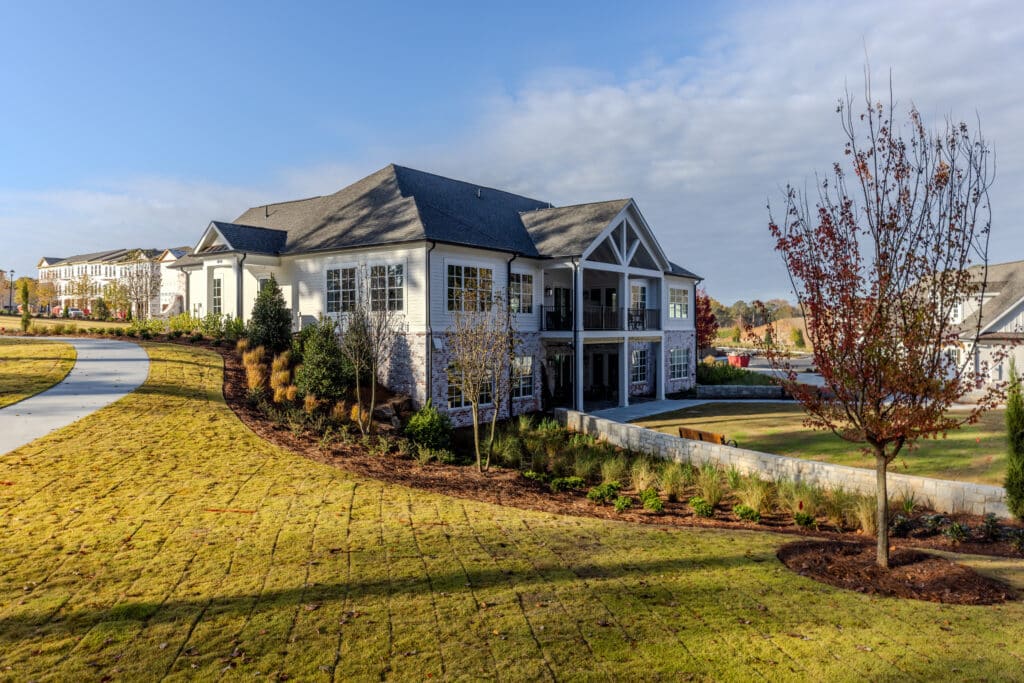
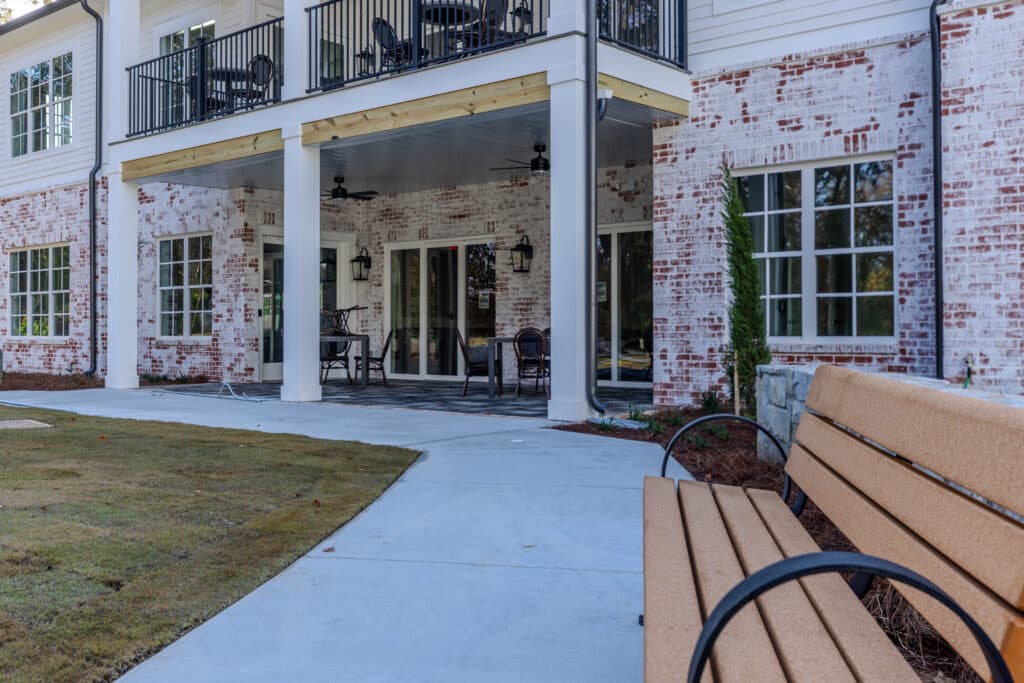
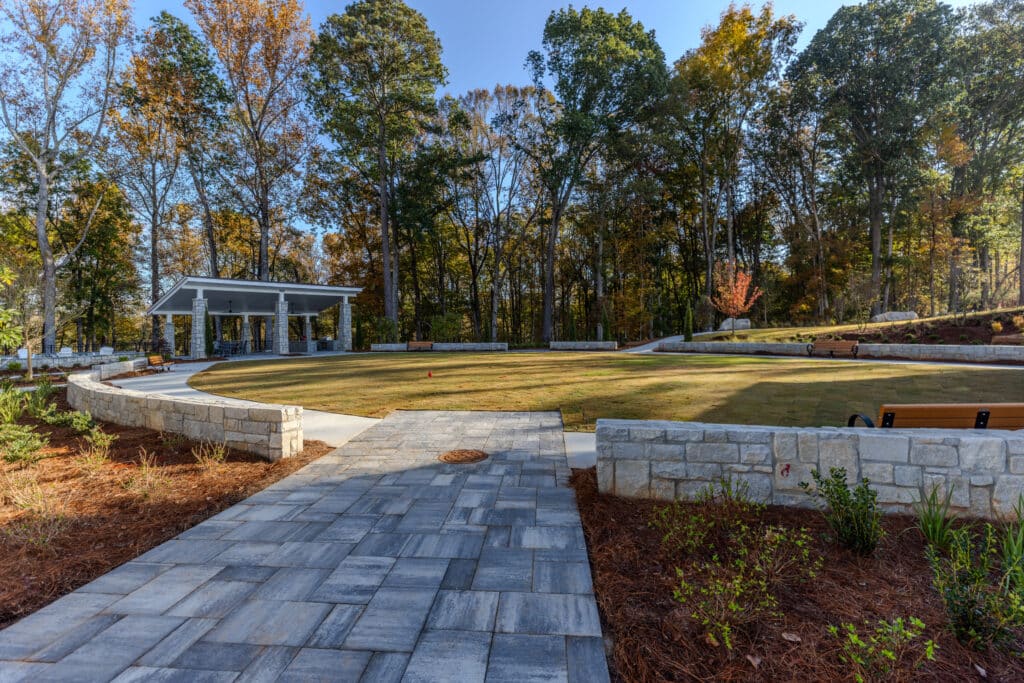
The 7,100 square-foot community clubhouse has a health and fitness center including aerobics room, two massage rooms and spa. There is a kitchen on the terrace level as well as a catering kitchen, expansive indoor and outdoor gathering rooms, card room and conference spaces on the main level.
“This marks a significant milestone for the Waterside community as it opens the doors to this exciting, state-of-the-art clubhouse amenity, which will allow for endless opportunities for social engagement throughout the community,” said Lisa Murphy, VP of Strategy at The Providence Group.
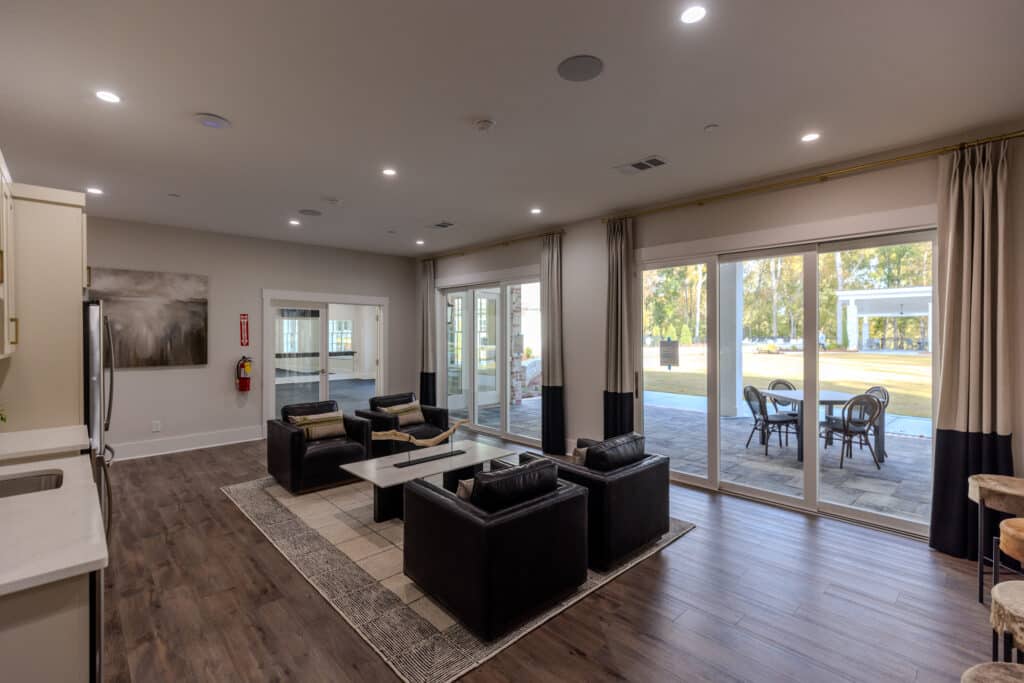
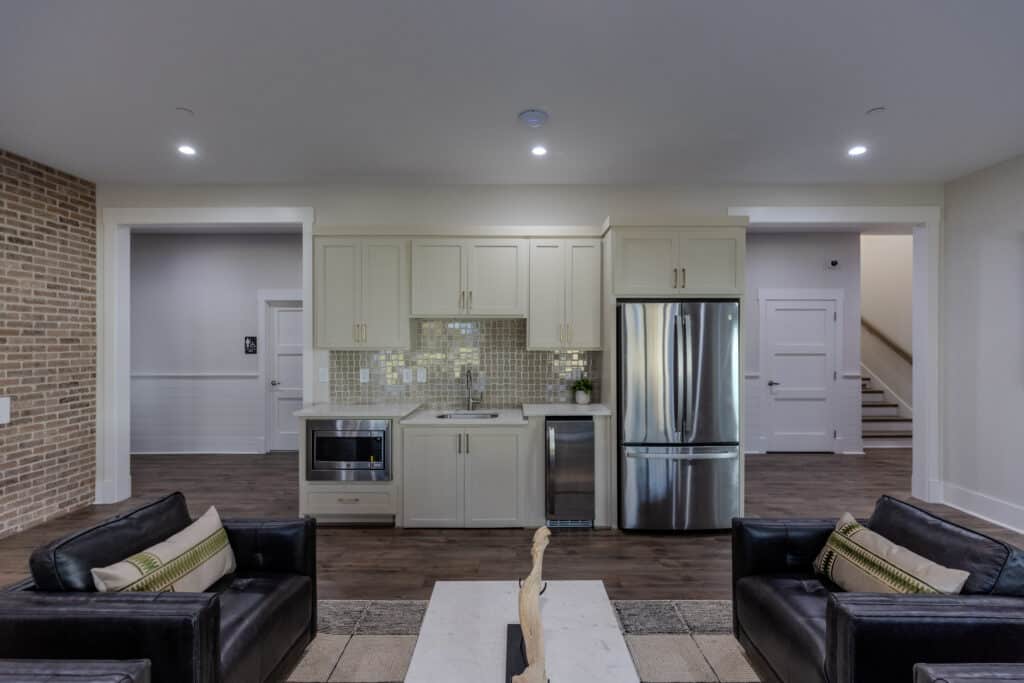
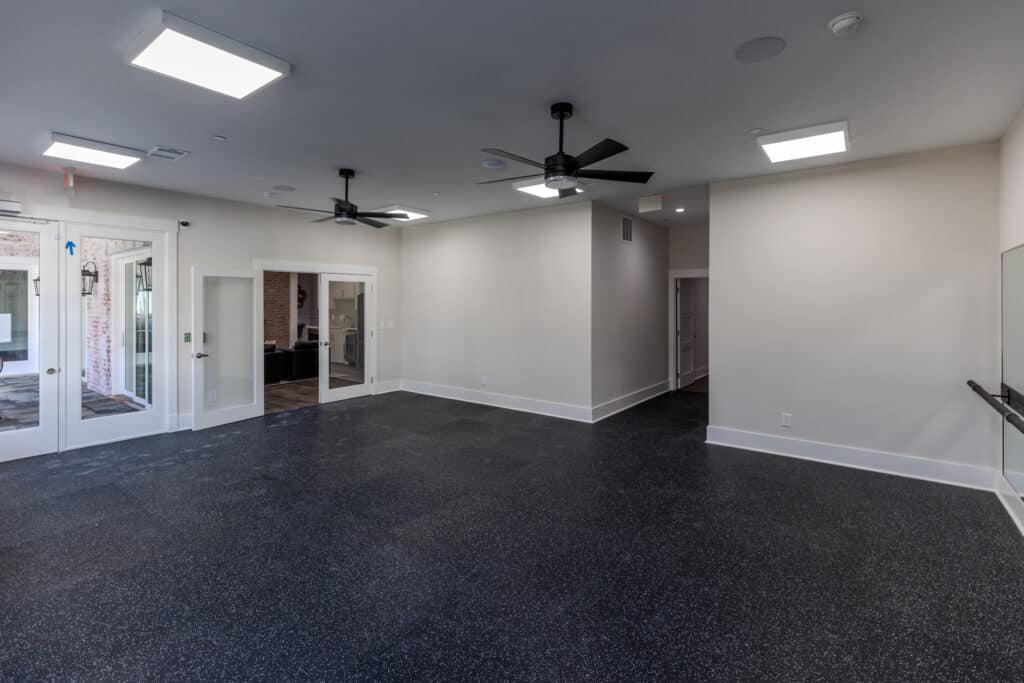
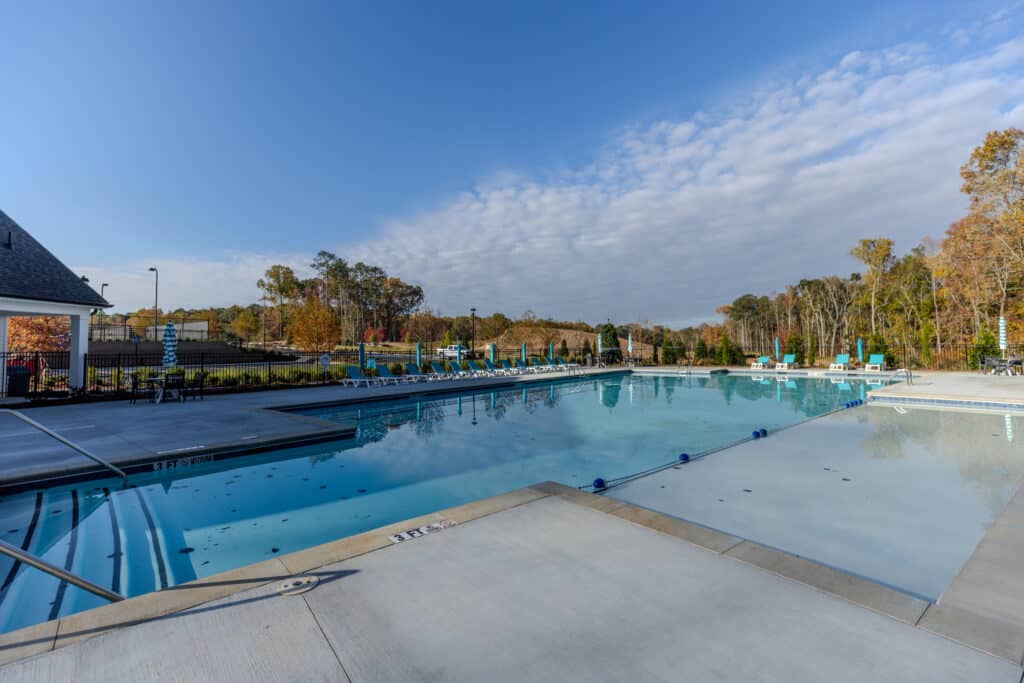
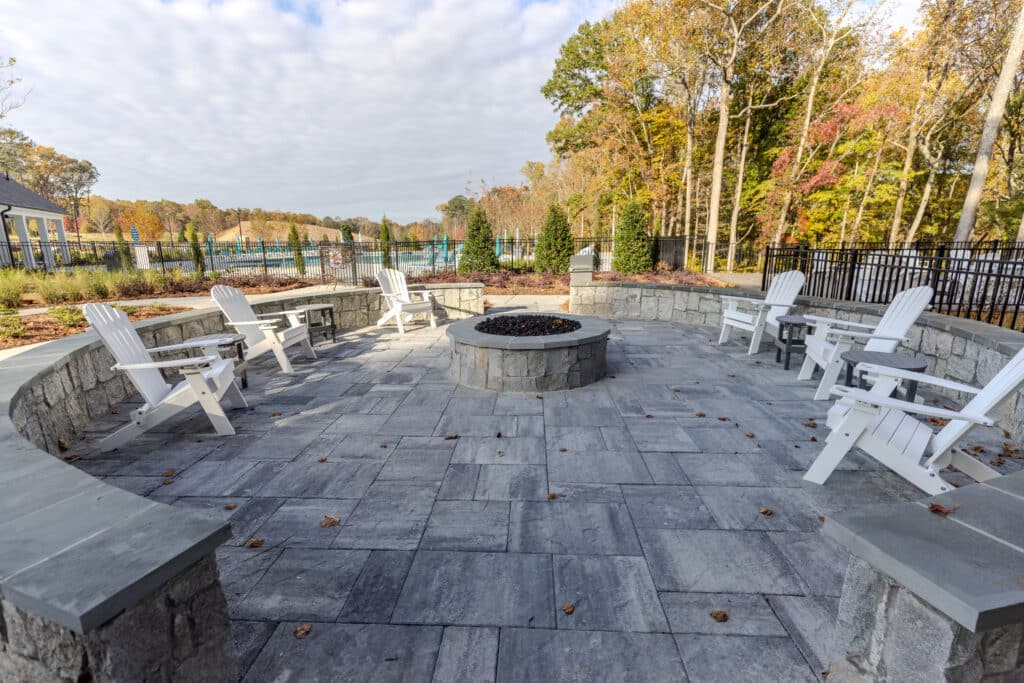
The gated community is also approved for golf carts so residents can take full advantage of this Peachtree Corners location, which was recently named to the Fortune 2023 list of 50 Best Places to Live for Families.
“Waterside residents will enjoy the balance of city conveniences and genuine outdoor, close to nature and state-of-the-art amenities, said Ty White, Partner with East Jones Bridge River Holdings. “Whether you are looking for outdoor activities, shopping, dining or entertainment, you will find it just minutes from your front door.”

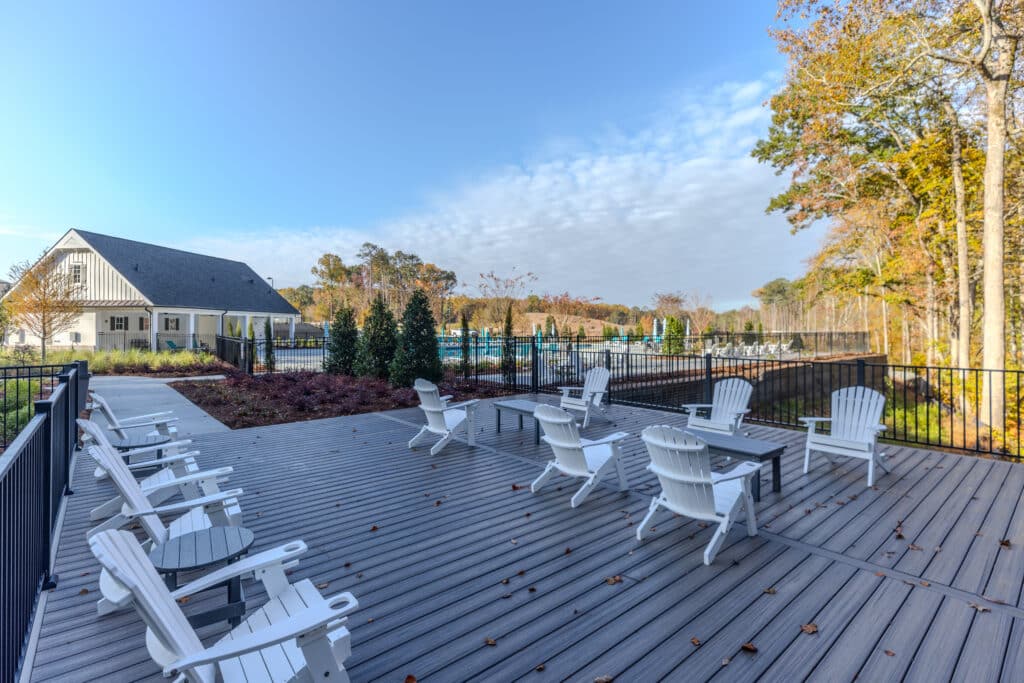
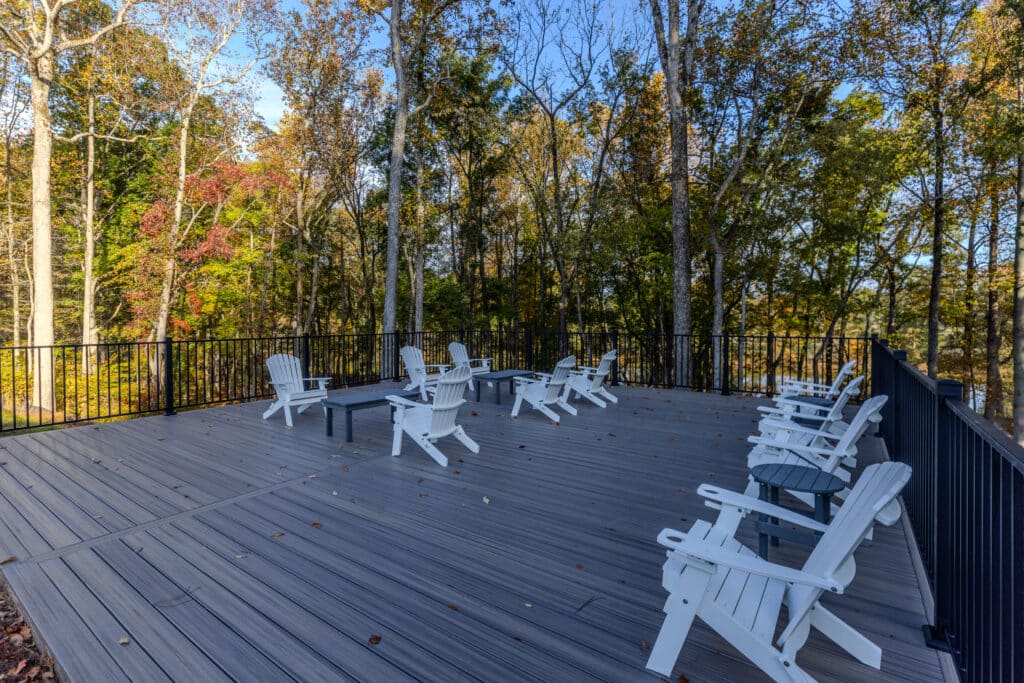
Located one mile from The Forum on Peachtree Parkway, Waterside’s initial phase of development focused on single-family detached homes, two-story and three-story townhomes with elevator options and unique one, two and three bedroom condos with private garages and no shared corridors.
Construction is now underway in phase 2, which will be a continuation of townhomes and condominiums, as well as 13 unique single family homes with views of the Chattahoochee River.
Learn more about Waterside in Peachtree Corners by visiting here.
Photos courtesy of Waterside Community
For more Peachtree Corners land use and development news, click here!
Related
Business
Alliance Residential Company Opens Broadstone Peachtree Corners
Published
6 months agoon
January 28, 2024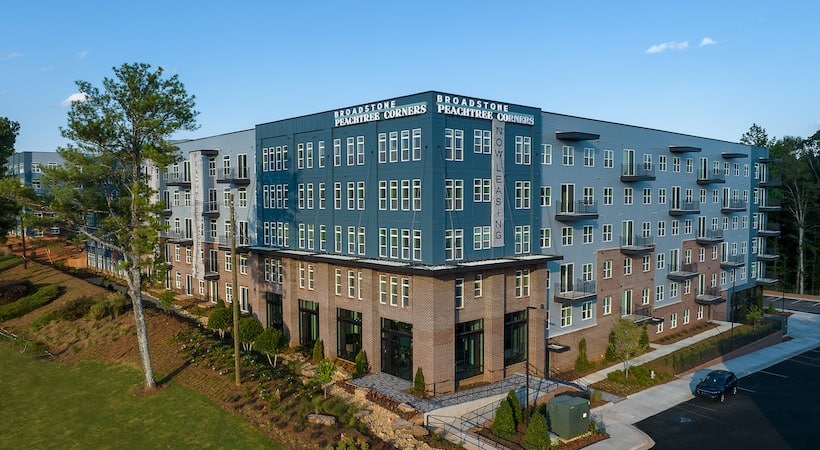
Alliance Residential Company, one of the largest multi-family developers in the nation, has opened Broadstone Peachtree Corners, a luxury mixed use community, featuring for sale townhomes and 20 for rent offices available to the public, branded as Second Story, A Private Office Collective.
Nestled next to Technology Park and set across 9.23 acres, both Broadstone Peachtree Corners and Second Story were designed to suit the needs of today’s remote and hybrid workforce that call the technology rich city of Peachtree Corners home.
“As technology companies invested in Peachtree Corners, it has become a hub for innovation and is experiencing tremendous growth, with housing and alternative office solutions in high demand,” said Alliance Residential Managing Director Noah Randall.
Located at 5672 Peachtree Parkway and designed by Brock Hudgins Architects, Broadstone Peachtree Corners five-story residential building includes studio-, 1- and 2-bedroom apartment homes.
Interiors feature condo quality finishes, including two distinct interior finishes schemes, designer lighting, premium Samsung appliances and nine-foot ceilings. Select homes feature oversized kitchen islands, custom entry benches and soaking tubs.
Taking inspiration from the abundance of green space throughout the city, the community features a nature-themed design scheme woven throughout its interiors to immerse residents in a magical woodland setting.
The community offers an impressive array of amenities, including a resort-style pool, fully equipped fitness center with private fitness studios, game lounge with indoor golf simulator and putting green, pet spa and dog run, clubroom with custom seating spaces and entertaining kitchen and a landscaped courtyard with outdoor games, grilling station and fire pit.
Second Story, A Private Office Collective, offers individual office space for rent to both residents of Broadstone Peachtree Corners and the surrounding community.
The collective features two reservable conference rooms, a co-working lounge with adjoining private outdoor terrace and community kitchen. Also included are high speed internet, access to on-property EV charging stations and a dedicated business mailing address.
“We envisioned Second Story as a space that seamlessly incorporates wellness into one’s daily work routine and viewed this as an important differentiator from other for rent communities in the submarket,” said Randall.
Click here for more Peachtree Corners development news.
Related
Read the Digital Edition
Subscribe
Keep Up With Peachtree Corners News
Join our mailing list to receive the latest news and updates from our team.
You have Successfully Subscribed!

Taste of Peachtree Corners: PCBA Showcases Local Restaurants

What’s going on at Jones Bridge Park and the Challenges of Urban Development

The Forum Gives Sneak Peek of New Eateries and Community Spaces

Southwest Gwinnett Mayors Share Visions for the Future

Peachtree Corners Shines Bright with Light Up the Corners Glow Race this August

8 Events Happening In and Around Peachtree Corners This August

Peachtree Corners Shines Bright with Light Up the Corners Glow Race this August

The Forum Gives Sneak Peek of New Eateries and Community Spaces

8 Events Happening In and Around Peachtree Corners This August

Southwest Gwinnett Mayors Share Visions for the Future

Taste of Peachtree Corners: PCBA Showcases Local Restaurants

What’s going on at Jones Bridge Park and the Challenges of Urban Development

Local Resident Opens AtWork Location in Peachtree Corners

CHRIS 180 Expands its Services into Gwinnett County [Podcast]

Light up the Corners [Video]

Capitalist Sage: Business Leadership in Your Community [Podcast]

Cliff Bramble: A Culinary Adventure through Italy

Top 10 Brunch Places in Gwinnett County

A Hunger for Hospitality

THE CORNERS EPISODE 3 – BLAXICAN PART 1

Top 10 Indoor Things To Do This Winter

The ED Hour: What it takes to Remove Barriers from Education
Peachtree Corners Life
Topics and Categories
Trending
-
Business1 week ago
Taste of Peachtree Corners: PCBA Showcases Local Restaurants
-
Business2 days ago
The Forum Gives Sneak Peek of New Eateries and Community Spaces
-
City Government4 days ago
Southwest Gwinnett Mayors Share Visions for the Future
-
Community2 days ago
Peachtree Corners Shines Bright with Light Up the Corners Glow Race this August







